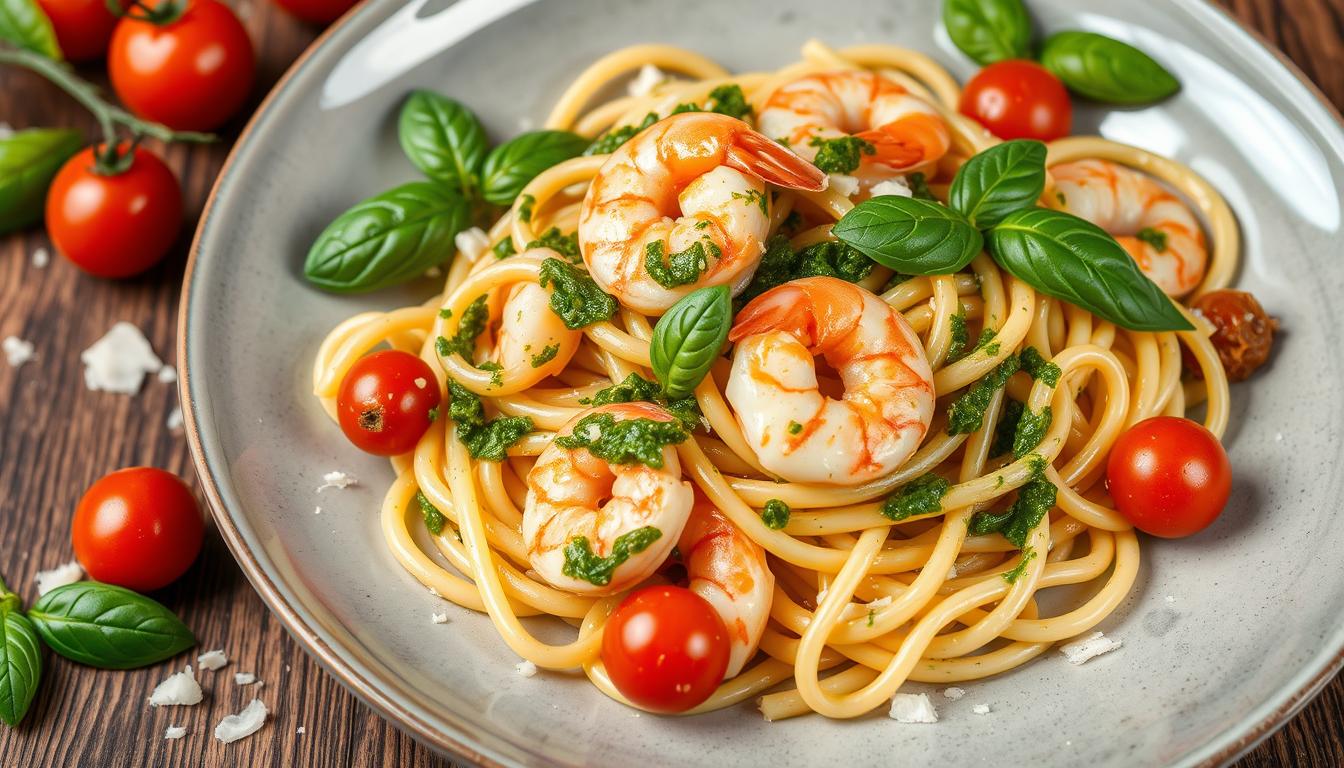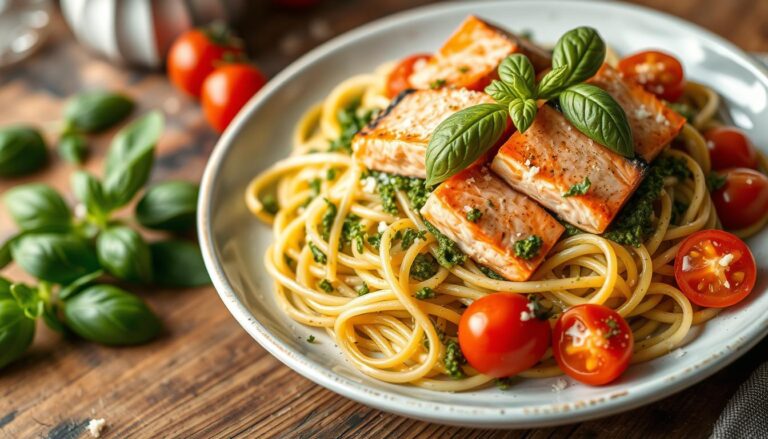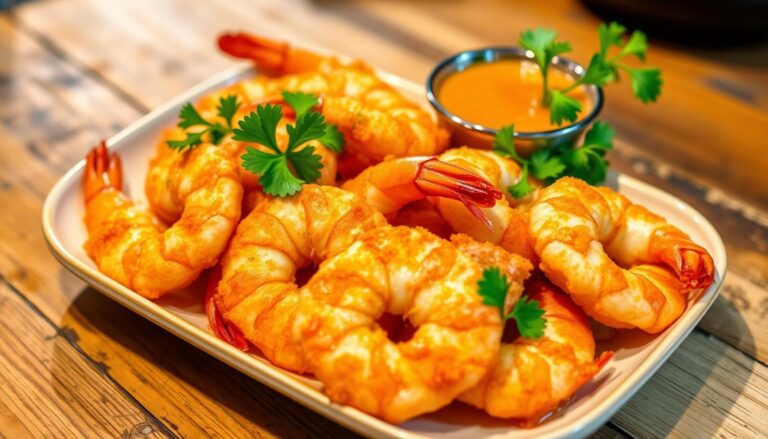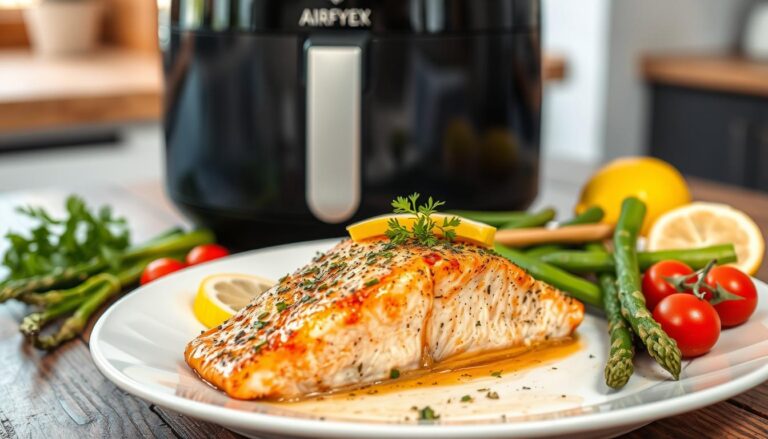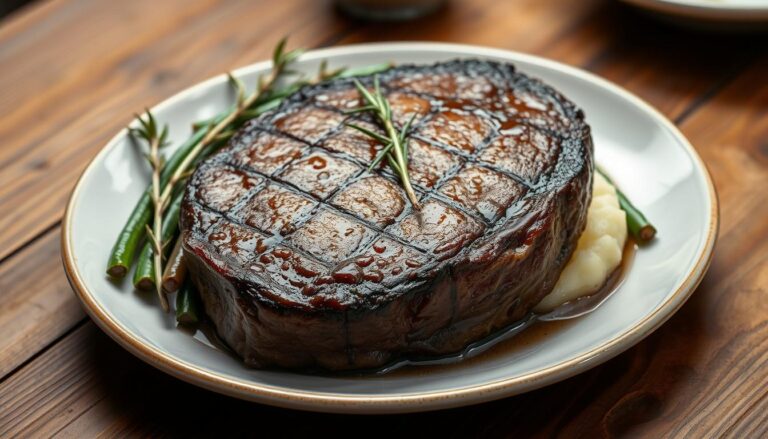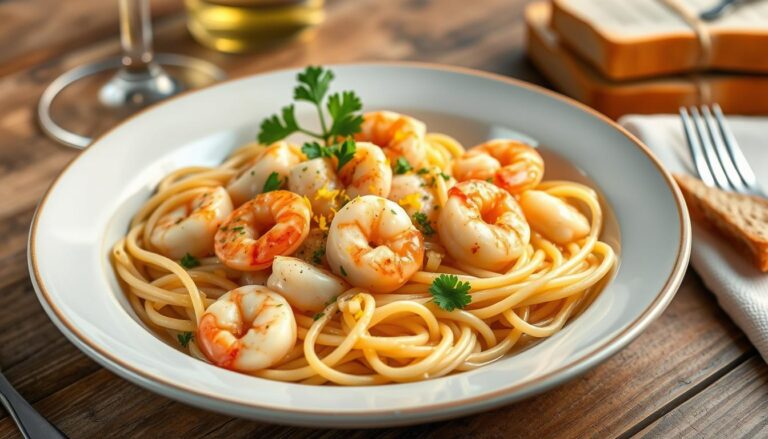Creamy Shrimp Pesto Pasta in 30 Minutes
Looking for a tasty and quick dinner? This shrimp pesto pasta recipe is your answer. It turns simple ingredients into a gourmet meal in just 30 minutes. It’s ideal for those who are always on the go.
Picture tender shrimp and perfectly cooked spaghetti, all covered in a vibrant green pesto. This sauce is full of fresh basil flavor. It’s creamy and rich, making you feel like you’re in a fancy kitchen, without spending hours cooking.
Table of Contents
Understanding Shrimp Pesto Pasta
Explore the world of Italian cuisine with a classic seafood pasta. It mixes rich flavors with simple ingredients. Shrimp pesto pasta is a blend of old cooking ways and new ideas.
Origins of Pesto Sauce
The word pesto comes from “pestare,” meaning to pound. It’s made the old way with a mortar and pestle. The real basil pesto recipe uses fresh herbs, garlic, pine nuts, olive oil, and Parmesan cheese.
“Pesto is not just a sauce, it’s a celebration of fresh ingredients and culinary tradition.”
Why This Recipe Works
This shrimp pesto pasta is great because it’s simple yet full of flavor. It has:
- Rich, herbaceous pesto sauce
- Tender, succulent shrimp
- Perfect al dente pasta
Key Benefits of This Dish
| Benefit | Description |
|---|---|
| Quick Preparation | Total cooking time of 30 minutes |
| Nutritional Value | 24.7 grams of protein per serving |
| Versatility | Adaptable to various dietary preferences |
This seafood pasta is perfect for any meal. It’s great for a casual dinner or a fancy meal. It offers flavor, nutrition, and is easy to make.
Essential Ingredients for the Perfect Sauce
Making a great garlic shrimp pasta begins with top-notch ingredients for your basil pesto. The right stuff turns a simple dish into a feast for your senses.
- 2 cups fresh basil leaves
- 1/4 cup pine nuts
- 1/2 cup freshly grated Parmesan cheese
- 3 garlic cloves
- 1/2 cup extra-virgin olive oil
For the garlic shrimp pasta, you’ll need:
- 1.5 pounds large shrimp (31-40 count)
- 8-10 oz spaghetti noodles
- 1 tablespoon olive oil for sautéing
- 1/2 teaspoon Old Bay Seasoning
“The secret to an amazing pasta dish lies in using fresh, high-quality ingredients.”
Here are some tips for making your basil pesto:
- Use freshly grated Parmesan for maximum flavor
- Choose extra-large shrimp for a more substantial bite
- Select high-quality olive oil
| Ingredient | Quantity | Purpose |
|---|---|---|
| Fresh Basil | 2 cups | Base of pesto sauce |
| Parmesan Cheese | 1/2 cup | Adds richness and depth |
| Large Shrimp | 1.5 pounds | Protein component |
By picking and mixing these ingredients carefully, you’ll make a garlic shrimp pasta that’s restaurant-worthy. It’s sure to wow your guests.
Choosing the Right Pasta and Shrimp
Creating the perfect prawn linguine starts with top-quality ingredients. Your pasta and shrimp choices are key to a great summer pasta salad. Let’s explore the essential selection process.
Best Pasta Types for Pesto
For a delicious pesto dish, some pasta shapes are better than others. Long pasta varieties are the best:
- Linguine – ideal for clinging to creamy pesto
- Spaghetti – classic choice for sauce retention
- Fettuccine – wider surface area for maximum flavor
Selecting Quality Shrimp
For the best seafood experience, focus on these shrimp selection criteria:
- Size matters: Choose large or jumbo shrimp
- Opt for peeled and deveined for convenience
- Check for firm, translucent appearance
Fresh vs Frozen Options
Both fresh and frozen shrimp can be great if prepared right. Here’s a comparison:
| Fresh Shrimp | Frozen Shrimp |
|---|---|
| Use within 24 hours | Thaw in cool water (20 minutes) |
| Peak flavor and texture | Convenient storage option |
| Higher cost | More budget-friendly |
“The secret to a perfect seafood pasta lies in ingredient quality and careful preparation.” – Professional Chef
Pro tip: Avoid pre-cooked shrimp. They often lack flavor and can become rubbery when reheated.
Making Fresh Basil Pesto from Scratch
Making authentic basil pesto is key to Italian cooking. It turns simple ingredients into a vibrant sauce. Your homemade pesto will make any pasta dish richer and more flavorful.
- 2½ cups fresh basil leaves, packed
- ½ cup pine nuts
- ½ cup extra virgin olive oil
- 1½ cups shredded parmesan cheese
- 2 tablespoons minced garlic
“Authentic pesto is about fresh ingredients and simple preparation” – Italian Cooking Tradition
The secret to great basil pesto is using fresh, quality ingredients. Start by lightly toasting the pine nuts to bring out their nutty taste. Then, blend the basil, pine nuts, and garlic until they’re finely chopped.
Slowly add the olive oil while blending to make a smooth sauce. Finally, add the parmesan cheese to keep its texture and avoid over-mixing.
| Ingredient | Quantity | Preparation Tip |
|---|---|---|
| Basil Leaves | 2½ cups | Use fresh, bright green leaves |
| Pine Nuts | ½ cup | Lightly toast before blending |
| Olive Oil | ½ cup | Use extra virgin for best flavor |
Pro tip: Your homemade basil pesto can be stored in an airtight container in the refrigerator for up to 7 days or frozen for 3 months.
Step-by-Step Cooking Process
Making garlic shrimp pasta is a quick and tasty dinner idea for busy cooks. It turns simple ingredients into a meal fit for a restaurant in just 30 minutes.
Start with the right ingredients and follow key steps. This will help you make a dish that will wow your family and friends.
Preparing the Perfect Pasta
Cooking pasta is an art that needs focus. Here’s how to do it right:
- Use a large pot with plenty of salted water
- Bring water to a rolling boil before adding pasta
- Stir occasionally to prevent sticking
- Cook until al dente – typically 8-10 minutes
- Reserve 1/2 cup of pasta water for sauce
Mastering Shrimp Cooking Techniques
Shrimp cook fast and can get tough if overcooked. Here’s how to get them just right:
- Pat shrimp dry with paper towels
- Season with salt, pepper, and smoked paprika
- Use medium-high heat with olive oil
- Cook 2-3 minutes per side until pink
- Look for the classic “C” shape indicating doneness
Combining Components with Finesse
The last step is to mix everything together. Sauté minced garlic in the shrimp pan, add white wine, and stir in pesto. Then, gently mix the cooked pasta into the sauce, making sure each strand is well coated.
“Cooking is about passion, so it may look slightly temperamental in a way that it’s too assertive to the naked eye.” – Gordon Ramsay
Your quick dinner idea is now ready – a garlic shrimp pasta dish that’s sure to be a hit with your family!
Creating the Creamy Pesto Sauce
Making the perfect creamy pesto sauce is an art. It turns your lemon pesto shrimp into a dish that wows everyone. The key is to mix rich flavors and get a smooth texture that sticks well to pasta.
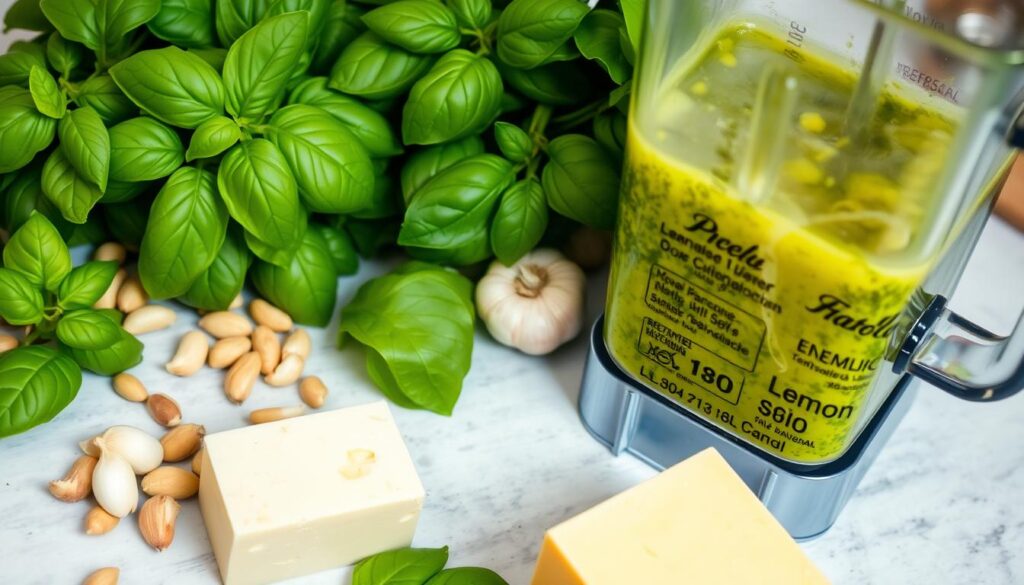
- Fresh garlic (2 cloves, minced)
- Unsalted butter
- Heavy cream
- Chicken stock
- Homemade or store-bought pesto
- Freshly grated Parmesan cheese
To make a top-notch creamy pesto sauce, layer your ingredients carefully. Start by melting butter in a pan and cooking the minced garlic until it smells great. Pro tip: Watch carefully to prevent burning!
“The perfect sauce is about balance and technique” – Professional Chef’s Wisdom
Then, add heavy cream and chicken stock, stirring gently to make a smooth base. Mix in your pesto, letting the basil’s fresh flavor stand out. Pesto usually has a 2:1 basil-to-other-ingredients ratio for a strong herbal taste.
Finally, add grated Parmesan cheese to thicken the sauce and add a nutty flavor. A squeeze of fresh lemon juice at the end adds brightness and cuts the cream’s richness.
Nutritional highlights of this sauce include:
- Low carb option available
- Contains 359 calories
- 24g of protein
- 25g of healthy fats
- 8g of carbohydrates
Your creamy pesto sauce is now ready to make your lemon pesto shrimp a gourmet dish!
Tips for Perfect Al Dente Pasta
Mastering pasta cooking in Italian cuisine needs precision and detail. Whether it’s a summer pasta salad or shrimp pesto, the right al dente texture makes a big difference.
Proper Water Temperature Matters
Begin with a large pot of water and bring it to a boil. The water’s temperature is key for even cooking. You want to cook the pasta so it’s not mushy.
Timing Techniques for Ideal Texture
Cooking time is crucial for your pasta dish. Here are some timing tips:
- Set a timer for precise cooking
- Taste-test pasta 1-2 minutes before package instructions
- Look for a slight resistance when biting
- Stop cooking when pasta is just tender
Salt Water Ratios for Flavor
Salting your pasta water is vital for flavor. Use these guidelines:
| Water Quantity | Salt Amount |
|---|---|
| 4 quarts | 1 tablespoon salt |
| 6 quarts | 1.5 tablespoons salt |
“The secret to great pasta is in the water and the timing.” – Italian Cooking Maestro
Pro tip: Save a cup of pasta water before draining. This starchy liquid can help adjust sauce consistency and enhance flavor in your summer pasta salad or shrimp pesto dish.
Professional Cooking Techniques
Making the perfect garlic shrimp pasta is more than just a recipe. Professional chefs know the special techniques that make a simple dish into a work of art.
Learning to cook seafood pasta starts with how you prepare the shrimp. Your cooking method can change the taste and texture of the dish a lot.
- Season shrimp generously before cooking
- Use high-heat cooking methods
- Prevent overcooking by watching carefully
- Leverage pan flavors for depth
Here are some professional techniques to use for your garlic shrimp pasta:
- Quick High-Heat Cooking: Sear shrimp quickly over medium-high heat to keep it tender
- Flavor Layering: Cook shrimp and sauce in the same pan for richer flavors
- Active Sauce Incorporation: Mix pasta with the sauce, don’t just pour it over
“The secret to exceptional seafood pasta lies in technique, not just ingredients.” – Professional Chef Recommendation
Pasta water is your secret ingredient. A little can make the sauce just right, coating the pasta perfectly.
| Technique | Impact | Professional Tip |
|---|---|---|
| High-Heat Searing | Locks in Shrimp Flavor | 30-45 seconds per side |
| Pan Sauce Building | Enhances Depth | Deglaze with white wine |
| Pasta Water Integration | Perfect Sauce Consistency | Add 2-3 tablespoons |
Using these professional techniques will make your seafood pasta dish as good as a restaurant’s. It will impress everyone who tries it.
Serving Suggestions and Garnishes
Creating the perfect italian cuisine experience is more than just the main dish. Your creamy shrimp pesto pasta needs thoughtful sides to make the meal complete.
Complementary Side Dishes
Choose side dishes that match the rich flavors of your shrimp pesto pasta:
- Garlic bread with crispy edges
- Light cucumber salad
- Traditional Panzanella
- Roasted vegetables with olive oil
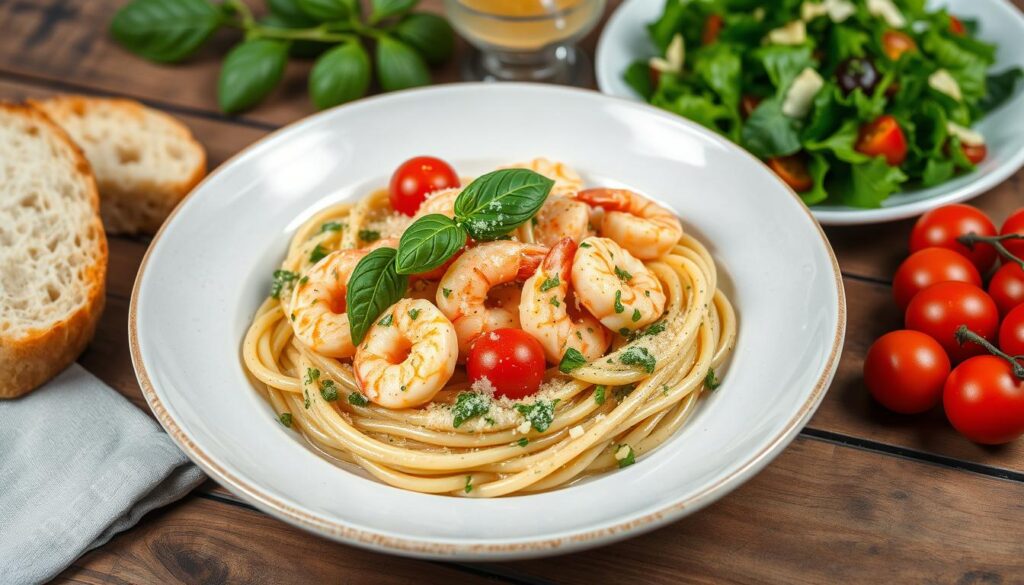
Garnish Options
Make your dish stand out with these garnish ideas:
- Fresh basil leaves
- Extra grated Parmesan cheese
- Toasted pine nuts
- Red pepper flakes for heat
- Chopped parsley
Wine Pairing Recommendations
“The right wine can transform a good meal into an unforgettable dining experience.”
Choose a crisp white wine to pair with your creamy pesto sauce and shrimp. Chardonnay is a great choice for this dish.
| Wine Type | Flavor Profile | Recommended Pairing |
|---|---|---|
| Chardonnay | Buttery, Smooth | Perfect Match |
| Pinot Grigio | Light, Crisp | Good Alternative |
Your summer pasta salad needs a wine that makes every bite special. Choose a sophisticated wine to enhance your meal.
Storage and Reheating Guidelines
After making your creamy shrimp pesto pasta, it’s important to store it right. This keeps the flavors and quality fresh. By storing your leftovers correctly, you can enjoy a tasty meal for days.
Refrigeration Best Practices
To keep your pesto dish fresh, follow these tips:
- Store pasta in an airtight container
- Refrigerate within 2 hours of cooking
- Keep in the refrigerator for up to 3-4 days
- Pro tip: Store pasta and sauce separately when possible
Reheating Techniques
Bring back your pasta’s delicious taste with these reheating tips:
- Stovetop method:
- Reheat on low heat
- Add a splash of cream or chicken broth
- Stir frequently to prevent sticking
- Microwave method:
- Use medium power
- Add a little liquid to prevent dryness
- Stir halfway through heating
“The secret to great leftover pasta is gentle reheating and a little extra moisture.” – Professional Chef
Freezing Options
For longer storage, freeze your pesto sauce for up to 3 months. Thaw it in the fridge overnight before using. Make sure to leave some space in the container for it to expand.
These storage tips turn your quick dinner ideas into easy, tasty meals. They taste almost as good as when you first made them.
Recipe Variations and Substitutions
Seafood pasta is a canvas for culinary creativity. Your shrimp pesto pasta can morph into many tasty dishes. Whether it’s a refreshing summer salad or a cozy dinner, these changes will make your meal exciting.
Protein Substitutions
Seafood pasta is flexible with protein options. Here are some tasty swaps:
- Chicken: 1:1 substitution ratio (1 pound raw chicken for 1 pound shrimp)
- Scallops: Delicate and sweet replacement
- Salmon: Rich, omega-3 packed option
Low-Carb Alternatives
For those on a low-carb diet, try these pasta substitutes:
- Zucchini noodles
- Spaghetti squash
- Cauliflower rice base
Nutritional Modifications
Make your summer pasta salad healthier with these tweaks:
| Ingredient | Substitution | Benefit |
|---|---|---|
| Heavy Cream | Coconut Cream | Dairy-Free Option |
| Parmesan Cheese | Nutritional Yeast | Vegan Alternative |
Vegetable Enhancements
Add more nutrition and flavor to your seafood pasta with these veggies:
- Cherry tomatoes
- Fresh spinach
- Roasted red peppers
- Artichoke hearts
“Cooking is about passion, creativity, and the joy of experimenting with flavors.” – Unknown Chef
Every variation keeps the essence of your shrimp pesto pasta. But it adds a new twist. Feel free to experiment and make it your own, fitting your taste and dietary needs.
Conclusion
Your shrimp pesto pasta journey ends with a tasty meal. It’s about making a quick dinner that feels like a special event. With just 30 minutes, you’ve made a dish full of flavor and health, with 48 grams of protein and 581 calories.
This recipe is a gem in your kitchen. It’s perfect for a light dinner or impressing guests. You can add vegetarian options or grilled veggies and garlic bread to make it even better.
Learning this recipe means more than just a meal. It’s a flexible, healthy, and tasty dinner idea that brings Italy to your kitchen. The basil pesto and shrimp make it a gourmet dish that’s easy and fun to make.
Great cooking is about passion, creativity, and enjoying the journey. Your shrimp pesto pasta shows that you don’t need to spend hours cooking. Just use fresh ingredients, smart techniques, and a bit of enthusiasm.
FAQ
How long can I store homemade pesto?
Can I use frozen shrimp for this recipe?
What are some alternative proteins I can use?
How can I make this dish lower in carbs?
What wine pairs best with Shrimp Pesto Pasta?
How do I prevent the shrimp from becoming rubbery?
Can I make this dish dairy-free?
What’s the best way to reheat leftover pasta?
Source Links
- Shrimp Pesto Pasta – https://www.tasteofhome.com/recipes/pesto-shrimp-pasta/?srsltid=AfmBOorzYgeaNCt5J6tBnyABqH_5MaZw9t8dQun5Z0ZmlHTtIIKgyrxv
- Creamy Pesto Pasta – https://www.chelseasmessyapron.com/creamy-pesto-tomato-pasta-a-sams-club-tour/
- Shrimp Pesto Pasta with Roasted Tomatoes – Evolving Table – https://www.evolvingtable.com/shrimp-pesto-pasta/
- Shrimp Pesto Pasta – The Pasta Twins – https://pastatwins.com/shrimp-pesto-pasta/
- Shrimp Pesto Pasta – https://www.tasteofhome.com/recipes/pesto-shrimp-pasta/?srsltid=AfmBOoq3YLdjGoHAAeopOij6o1snOHwng33j52GSMDu7L_bPYw2GRJy5
LEAVE A COMMENT
Have a question? Use the form below to submit your question or comment. I love hearing from you & seeing what you made!
There are no reviews yet. Be the first one to write one.

